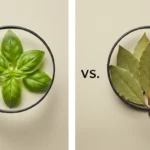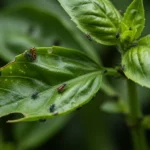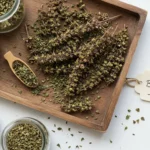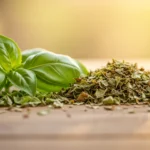Picture this: eight years ago, a young, eager Kalsoom Imran, fresh into gardening, proudly surveyed her first basil plant, only to discover a bustling ant highway marching up its stem. That’s when I learned firsthand just how quickly those tiny invaders can turn a fragrant herb into their personal picnic spot. Now, after years of trial and error, I’m sharing my secrets on how to get rid of ants in my basil plant, quickly and easily.
Understanding the Ant Problem on Your Basil Plant
Why Are Ants Attracted to My Basil?
Okay, so you’ve got ants marching all over your beautiful basil plant. It’s frustrating, I know! But before we dive into getting rid of them, let’s understand why they’re there in the first place. It’s not that they’re particularly fond of the basil leaves themselves, usually. More often than not, they’re after something else entirely.
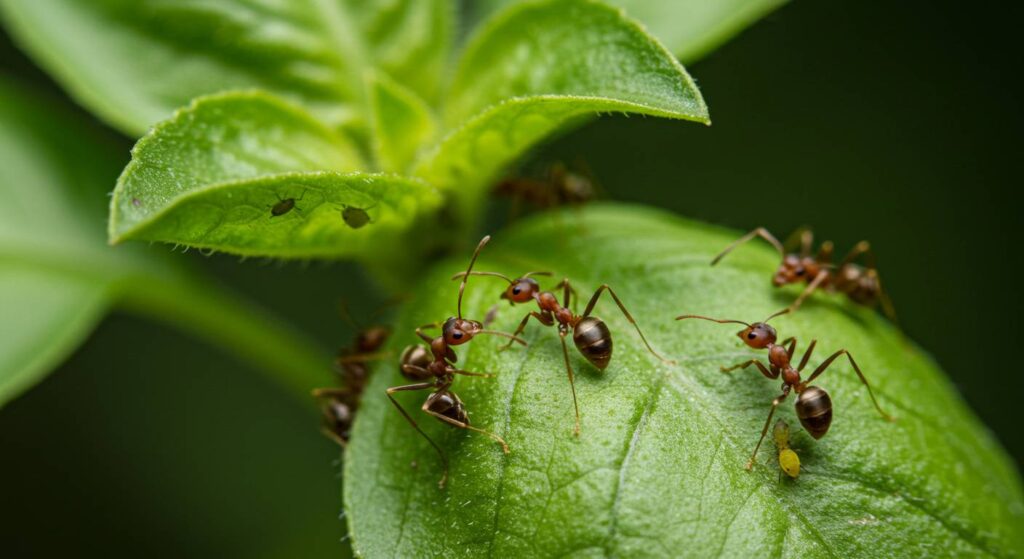
One of the main culprits is honeydew-producing pests, like aphids and mealybugs. These little guys suck the sap from your basil and excrete a sweet, sticky substance called honeydew, which ants absolutely adore. It’s like a free buffet for them! Sometimes, the basil itself might have some sweet secretions on its leaves or stems, which can also attract ants.
They are also often seeking shelter and moisture, especially during hot, dry weather. Your basil plant, with its dense foliage and moist soil, can be the perfect little oasis for them. And, of course, it’s helpful to know what kind of ants you’re dealing with. Are they those tiny little small ants, or something bigger? This can sometimes influence the best approach for ant treatment for basil.
Effective Methods to Eliminate Ants on Basil Plants
Natural Ant Control for Basil
When it comes to getting rid of ants naturally basil, I always prefer to start with the gentlest methods first, especially when dealing with something I plan to eat. Here are some of my go-to natural solutions:
Water Spray
A strong stream of water can be surprisingly effective at cleaning ants off basil. It’s like a mini-flood that washes away the ants and any honeydew they’re after. I usually use my garden hose with a spray nozzle and give the plant a good blast, making sure to get under the leaves where ants often hide. It’s a simple way to remove ants from basil plant and it can be repeated as needed.
Diatomaceous Earth
Diatomaceous earth (DE) is a fantastic, natural option for safe ant removal basil. Make sure you’re using the food-grade variety. DE is made from fossilized algae and it works by dehydrating insects. It’s completely safe for humans and pets, but deadly to ants. I like to sprinkle a thin layer of DE around the base of the plant and on the soil. Just be careful not to inhale the dust.
Neem Oil
Neem oil is another organic ant removal basil solution that I often turn to. It’s a natural insecticide that disrupts the life cycle of many pests, including ants. I mix neem oil with water according to the instructions on the bottle and then spray it all over the plant, making sure to coat both the top and undersides of the leaves. It’s effective for basil plant pest control ants and other pests as well.
Soapy Water
A mild soapy water solution can also help manage ants on basil. I use a few drops of dish soap (not detergent) in a spray bottle with water. Then, I spray the plant thoroughly, making sure to cover all the leaves and stems. The soap disrupts the ant’s exoskeleton, leading to dehydration. It’s important to use a mild soap and rinse the plant off with clean water after a few hours to prevent any damage.
Vinegar Solution
A diluted vinegar solution is a simple home remedy for ants on basil. I mix equal parts of white vinegar and water in a spray bottle and then spray it on the plant. The vinegar smell is a deterrent for ants, and it can also help to break down any honeydew. However, be cautious as vinegar can be harsh on plants, so don’t use it too often or in high concentrations.
Citrus Peels
Citrus peels are a great way to deter ants from basil. Ants don’t like the smell of citrus, so placing some orange, lemon, or grapefruit peels around the base of your basil plant can help keep them away. I just scatter the peels around and replace them every few days as they dry out. It’s a simple, natural way to prevent ants on basil.
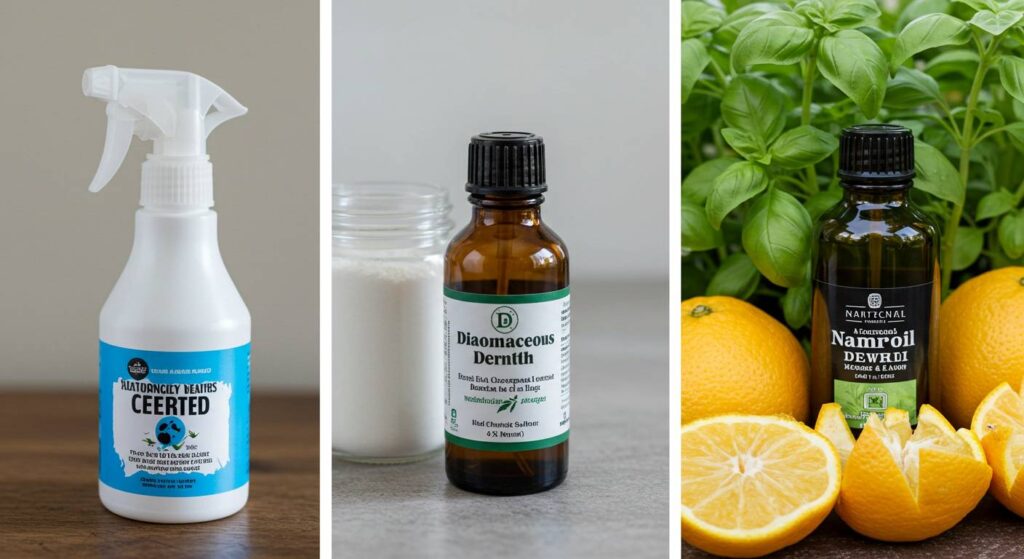
Other Ant Treatment Options for Basil
Sometimes, natural methods aren’t quite enough, and you might need to bring in some other solutions. Here are a few more options for ant treatment for basil:
Ant Baits
Ant baits are an effective best way to kill ants on basil, especially if you’re dealing with a larger infestation. These baits contain a sweet substance that attracts ants, along with a slow-acting poison. The ants take the bait back to their colony, which helps to eliminate the entire nest. When using baits around basil, be careful to place them where they won’t come into contact with the plant.
Sticky Traps
Sticky traps are another way of controlling ants around basil. These traps are coated with a sticky substance that traps ants as they walk across them. I usually place these traps around the base of the plant or along ant trails. They won’t eliminate the entire colony, but they can help reduce the number of ants on your basil.
Insecticidal Soap
Insecticidal soap is a stronger option for basil plant pest control ants. It’s similar to soapy water, but it’s formulated specifically to kill insects. It works by disrupting their cell membranes. I follow the instructions on the product label carefully and spray the plant thoroughly, making sure to cover all the affected areas.
Step-by-Step Guide to Remove Ants from Basil Plant
Inspect Your Basil Plant
Before you start any treatment, it’s important to do a thorough inspection of your basil plant. Take a good look at where the ants are located. Are they mostly on the ants on basil leaves, or are they also on the ants on basil stems, or even in the ants in basil soil? Also, check for the presence of other pests, like aphids or mealybugs, which might be the root cause of the ant problem on basil.
Assess the severity of the infestation. Are there just a few ants, or is it a full-blown basil plant ant infestation? This will help you decide which treatment method is best.
Choose Your Ant Removal Method
Based on your inspection and your personal preferences, it’s time to choose your ant removal method. If you’re dealing with a minor infestation, you might want to start with natural methods like a water spray or soapy water. If the infestation is more severe, you might need to use something stronger like ant baits or insecticidal soap. Always consider safe ant removal basil options, especially if you plan to eat the basil.
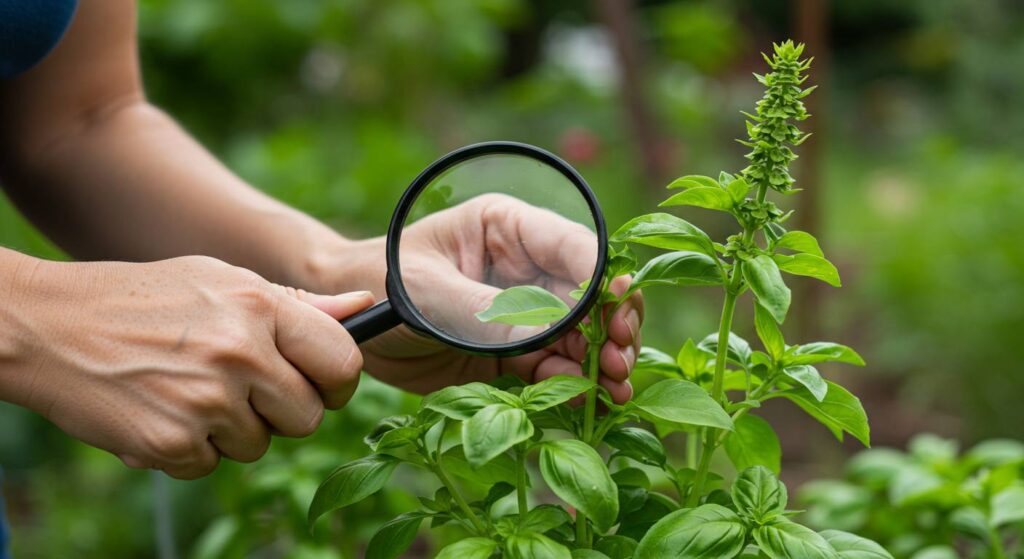
Apply Your Chosen Method
Once you’ve chosen your method, it’s time to apply it. If you’re using a water spray, give the plant a good blast, making sure to get under the leaves. For diatomaceous earth, sprinkle a thin layer around the base of the plant and on the soil. If you’re using neem oil, soapy water, or vinegar solution, spray the plant thoroughly, making sure to cover all the affected areas.
For ant baits, place them strategically around the plant where they won’t come into contact with the leaves. Always follow the instructions on the product label carefully. And remember, frequency is key. You might need to repeat the application every few days or weekly, depending on the method and the severity of the infestation.
Monitor and Repeat as Needed
After applying your chosen method, it’s important to monitor your basil plant regularly. Check for any signs of new ant activity. If you see ants returning, you might need to repeat the treatment. It’s also important to be proactive and take steps to keep ants off basil long-term. This might involve cleaning up the area around the plant, managing moisture levels, and controlling other pests. If one method isn’t working, don’t be afraid to try something else.
Preventing Future Ant Infestations on Basil
Keep Your Basil Plant Clean
One of the best ways to prevent ants on basil is to keep your plant clean. Regularly remove any dead leaves or debris that might be accumulating around the base of the plant. These can provide hiding places for ants and other pests. Also, remember to clean ants off basil regularly, even if you don’t see a major infestation. A quick spray with water can help keep them at bay.
Manage Moisture Levels
Ants are often attracted to moisture, so it’s important to manage the moisture levels around your basil plant. Avoid overwatering, as this can create a damp environment that ants love. Make sure your pot has proper drainage holes, so the soil doesn’t stay soggy.
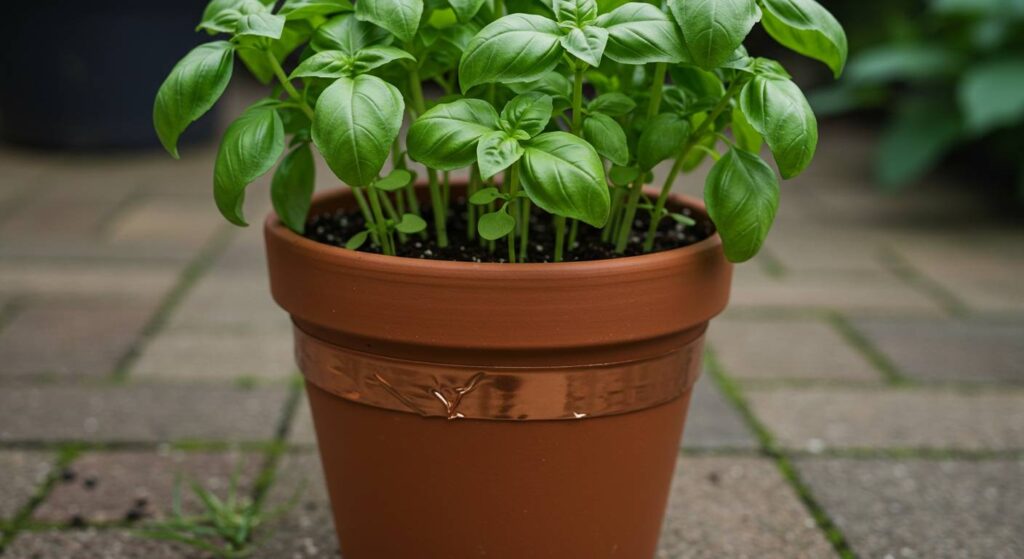
Control Other Pests
As I mentioned earlier, ants are often attracted to basil because of other pests, like aphids and mealybugs. These pests produce honeydew, which is a favorite food of ants. If you want to protect basil from ants, you need to address these other pest problems. Use natural methods like neem oil or insecticidal soap to control them. You can also find information on how to get rid of bugs on basil plant.
Physical Barriers
Physical barriers can also be effective at how to prevent ants on basil. You can try wrapping the base of your basil plant’s stem with petroleum jelly or copper tape. Ants don’t like to cross these barriers, which can help keep them off your plant.
Specific Ant Scenarios & Solutions
Ants on My Basil Indoors
If you have ants on my basil indoors, you’ll need to adapt your methods slightly. Since you’re dealing with an indoor environment, you’ll want to be extra careful about using chemicals. Natural methods like water sprays, soapy water, and diatomaceous earth are usually the best options. You’ll also want to make sure you’re not leaving any food or crumbs around that might be attracting ants. You may also find our article on how to get rid of bugs on indoor basil useful.
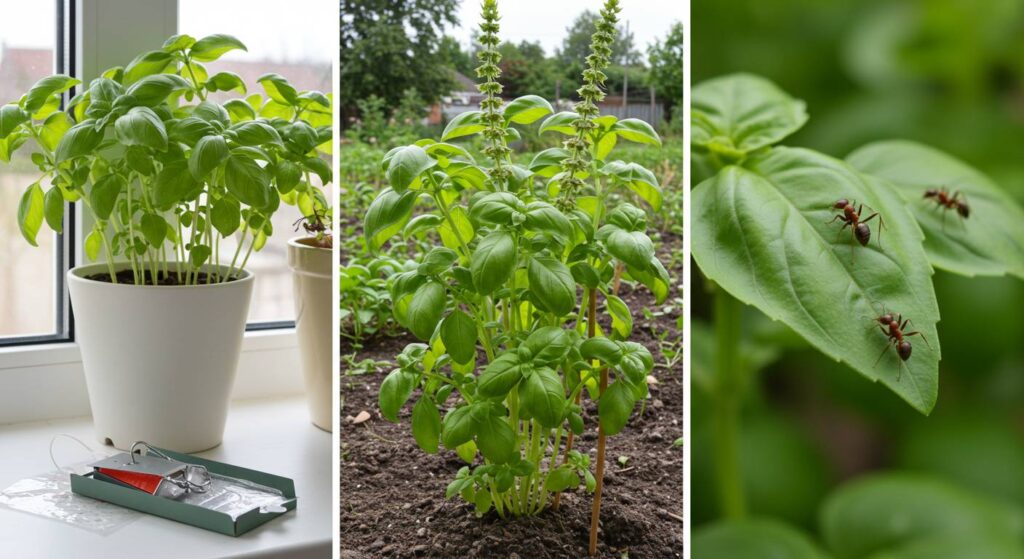
Ants on My Basil Outdoors
Outdoor ant control strategies might involve a combination of natural methods and, if necessary, stronger treatments like ant baits. It’s also important to consider the surrounding environment. Are there any ant colonies nearby? If so, you might need to address them directly. Make sure to protect basil from ants in the garden by using barriers and keeping the area clean.
Getting Rid of Small Ants on Basil
Getting rid of small ants on basil can sometimes be more challenging because they can squeeze into tiny spaces. For these, focusing on baits and sticky traps can be effective. Also, make sure to identify and target any small ant colonies that might be nearby.
Frequently Asked Questions About Ants on Basil
Are ants harmful to basil plants?
While ants don’t directly eat basil leaves, they can cause indirect damage. The honeydew they produce can lead to sooty mold, which can interfere with photosynthesis. Also, ants can sometimes spread other pests that can harm your basil. So, it’s important to stop ants eating my basil indirectly by addressing the root cause of the problem. You can also read our article on what is eating my basil if you suspect other pests.
How often should I treat my basil for ants?
The frequency of treatment depends on the method you’re using and the severity of the infestation. For natural methods like water sprays and soapy water, you might need to treat your plant every few days. For stronger methods like ant baits, you might only need to apply them once every few weeks. The key is to monitor your plant regularly and repeat the treatment as needed.
Is it safe to eat basil after ant treatment?
The safety of eating basil after treatment depends on the method you’ve used. If you’ve used natural methods like water sprays, soapy water, or neem oil, it’s usually safe to eat the basil after rinsing it thoroughly. However, if you’ve used stronger methods like insecticidal soap or ant baits, you’ll want to wait a few days before harvesting. Always wash your basil thoroughly before eating it, regardless of the treatment you’ve used.
What are the best basil ant solutions?
The best basil ant solutions depend on your situation. For minor infestations, natural methods like water sprays, soapy water, and diatomaceous earth are usually effective. For more severe infestations, you might need to use stronger methods like ant baits or insecticidal soap. The key is to choose a method that is safe for you and your plant and that effectively addresses the problem.
Conclusion: Achieving Ant-Free Basil
Recap of key strategies for getting rid of ants naturally basil
So, we’ve covered a lot of ground! Remember, getting rid of ants naturally basil involves understanding why they’re there in the first place, using a combination of natural methods like water sprays, soapy water, diatomaceous earth, neem oil, and vinegar solutions, and if needed, using stronger methods like ant baits and insecticidal soap. It’s also crucial to prevent future infestations by keeping your plant clean, managing moisture levels, controlling other pests, and using physical barriers.
Importance of consistent monitoring and prevention
The key to success is consistent monitoring and prevention. Don’t just treat your plant once and forget about it. Check it regularly for signs of new ant activity and take steps to keep them away. By being proactive, you can keep your basil plant healthy and ant-free. If you’re also dealing with other issues, see our guide on how to get rid of basil plant flies.
Enjoy your healthy, ant-free basil plant!
With the right strategies and a little bit of patience, you can have a healthy, ant free basil plant that you can enjoy all season long. Happy gardening!
